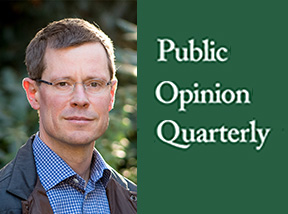
Forst Family Professor of Political Science Gregory Huber has a new article in Public Opinion Quarterly with postdoctoral scholar Omer Yair entitled “How Robust Is Evidence of Partisan Perceptual Bias in Survey Responses? A New Approach for Studying Expressive Responding.”
Abstract:
“Partisans often offer divergent responses to survey items ostensibly unrelated to politics. These gaps could reveal that partisanship colors perception or, alternatively, that in answering survey questions, individuals communicate partisan proclivities by providing insincere, or “expressive” responses, to send a partisan message. This study tests two techniques for reducing expressive responding that (1) avoid criticisms about using monetary incentives for accuracy, which have reduced measured partisan differences for objective facts; and (2) can be used in contexts where incentives are infeasible, such as when objective benchmarks for correct responses are unavailable. This study experimentally tests these techniques in replicating a study that found that partisanship affected attractiveness evaluations. These interventions, which allow partisans to express their partisan sentiments through other survey items, substantially reduce apparent partisan differences in beauty evaluations and show that standard survey items likely confound sincere partisan differences with elements of expressive responding.”